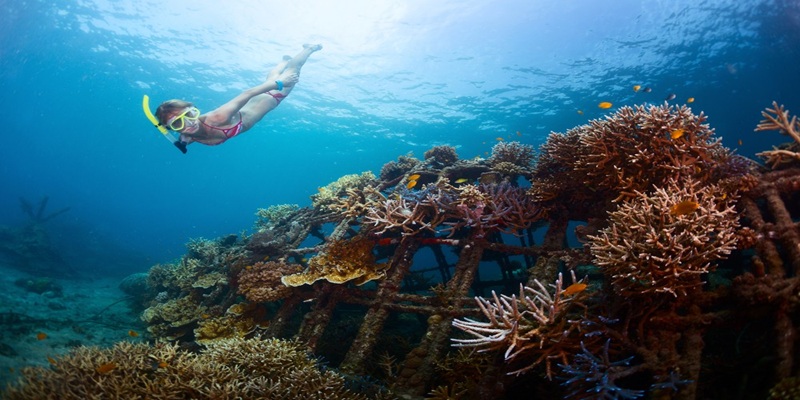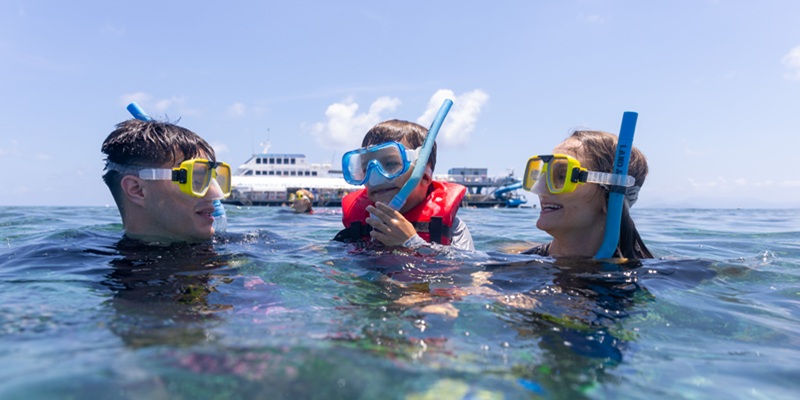Where Are The Best Snorkeling Spots In The Caribbean
The Caribbean, known for its stunning beaches and vibrant cultures, also boasts crystal-clear waters perfect for snorkeling. With colorful coral reefs and abundant marine life, it offers the best snorkeling in the Caribbean. These adventures not only create lasting memories but also support local economies and conservation efforts.
In this article, we will journey through some of the best snorkeling spots across the Caribbean, featuring the breathtaking coral gardens of Bonaire, the mesmerizing underwater caves of the Bahamas, and the vibrant reefs of the British Virgin Islands. Each destination offers unique opportunities for novice and skilled snorkelers, reaffirming the Caribbean's status as a diver's paradise. Prepare yourself for a deep dive into the vibrant blue as you discover the enchanting secrets of the ocean!

The Allure Of Caribbean Snorkeling
The Caribbean Sea offers extraordinary snorkeling experiences, with vibrant coral reefs and abundant marine life, from parrotfish to angelfish. These ecosystems, including mangroves and lagoons, provide essential habitats and exemplify the ecological balance necessary for a healthy ocean. Coral reefs, often called "rainforests of the sea," are home to unique species found nowhere else on Earth, emphasizing the importance of conservation.
snorkeling stands out for its accessibility and tranquil nature, requiring minimal gear and offering a serene way to explore underwater life. Unlike more physically demanding water sports, it allows adventurers to leisurely glide above coral gardens, fostering both enjoyment and a deeper connection to marine conservation efforts.
1. Belize Barrier Reef: A Snorkeling Paradise
The Belize Barrier Reef, recognized as the world's second-largest coral reef system, spans 185 miles along the Belize coastline. A UNESCO World Heritage Site, this stunning underwater paradise is an ecological marvel, harbouring over 500 fish species, numerous intricate coral formations, and a vibrant biodiversity essential to marine ecology. The reef serves as a sanctuary for diverse marine life and protects against coastal erosion, safeguarding the idyllic beaches and communities lining the coast.
Hol Chan Marine Reserve and Shark Ray Alley stand out among the must-visit spots for snorkelers within the Belize Barrier Reef. The Hol Chan Marine Reserve, with its crystalline waters and thriving coral gardens, provides a chance to swim among many tropical fish, sea turtles, and even the occasional manatee. Neighbouring Shark Ray Alley is famous for its friendly nurse sharks and gentle stingrays. It offers visitors rare opportunities to engage closely with these benign creatures in their natural habitat, culminating in an unforgettable snorkeling experience.
When planning a visit, the ideal time to snorkel in Belize generally runs from April to June, when water visibility is optimal and marine life is abundant. To enhance your adventure, consider booking guided snorkeling tours, which typically provide all necessary gear, knowledgeable guides, and transportation from major coastal towns such as San Pedro or Caye Caulker. These tours enrich the experience through local expertise and promote responsible tourism by partnering with eco-friendly companies that preserve the delicate reef ecosystems. Whether you're a snorkeling beginner or an experienced diver, the Belize Barrier Reef beckons with its magical underwater world, inviting all to explore.
2. The Bahamas: Diving Into a Tropical Oasis
The Bahamas is an idyllic paradise with more than 700 islands and cays. It is an enlightening snorkeling destination with breathtaking underwater experiences. Among the highlights are the Exuma Cays Land and Sea Park, a protected area known for its pristine reefs and vibrant marine life, and the iconic Thunderball Grotto, made famous by the James Bond film.
These locations create unforgettable opportunities for snorkelers to encounter diverse marine species while engaging with breathtaking underwater scenery. Many areas in the Bahamas teem with sea turtles, colourful fish, and stunning coral formations, allowing snorkelers to connect with nature truly. Visitors are advised to bring their snorkeling gear to explore these stunning sites fully and adhere to local regulations regarding snorkeling and conservation efforts. Awareness of the underwater ecosystem and sustainability is vital for preserving these beautiful environments for future generations.
3. The Virgin Islands: An Underwater Fantasy
Delving into the Virgin Islands provides snorkelers access to underwater diversity and showcases some of the Caribbean's finest snorkeling spots. Both the British and U.S. Virgin Islands boast remarkable locations that beckon snorkelers. The Baths in Virgin Gorda, with its stunning rock formations and clear waters, invite exploration, while Buck Island offers pristine coral reefs and vibrant marine life perfect for observation.
Engaging in guided tours or private exploration is viable in this region. Guided tours often include knowledgeable guides who can enhance the experience with their insights into marine life and the local environment. At the same time, independent excursions may offer the thrill of unravelling the seas at your own pace. The Virgin Islands epitomize the underwater wonders awaiting explorers eager to discover unique marine environments.
4. Grand Cayman: A Snorkeling Crown Jewel
Grand Cayman is home to world-renowned snorkeling experiences, particularly along Seven Mile Beach and the famous Stingray City. Coral Gardens's shallow, crystal-clear waters allow snorkelers to interact with diverse marine life, including colourful fish and coral formations.
The calm waters are especially inviting for families and novices, making Grand Cayman an ideal location for a safe and enjoyable snorkeling experience. Tips for parents include bringing floatation devices or life jackets for young children to ensure their safety. Grand Cayman effortlessly combines relaxation and exploration, making it a haven for snorkelers of all skill levels.
Tips For a Successful Snorkeling Adventure
snorkeling in the Caribbean is an exhilarating way to experience the underwater realm, but ensuring a safe and environmentally responsible outing is essential. Here are critical guidelines to enhance your adventure:

1. Safety First: Always verify weather conditions and local current reports before venturing out. Snorkel with a buddy and establish clear communication signals. Familiarize yourself with the snorkeling area, always remaining attentive to your surroundings.
2. Respect Marine Life: Maintain a safe distance from coral reefs and marine creatures to avoid disturbing their natural habitats. Never touch or step on corals; these delicate ecosystems are crucial for aquatic biodiversity.
3. Essential Items to Bring:
Snorkeling Gear: Ensure you have a well-fitting mask, a snorkel with a dry top, and swim fins. If feasible, a wetsuit can provide additional insulation and buoyancy.
Sunscreen: Opt for reef-safe sunscreen to protect your skin and aquatic life. Look for brands free from harmful chemicals like oxybenzone and octinoxate.
Hydration: Carry a reusable water bottle to stay hydrated. The intense heat can be challenging, so drink water regularly, regardless of thirst.
4. Understanding Local Customs: Learn about the local culture and customs before diving into the waters. Respect the rules established by local marine parks or guided tours. Learning local customs can significantly enhance your snorkeling experience and foster goodwill within the community.
With these tips, you're prepared to embark on a remarkable snorkeling adventure while supporting the preservation of pristine underwater environments. Enjoy your exploration!
Dive Deep Into Nature's Wonders
The Caribbean offers extraordinary snorkeling experiences, immersing adventurers in vibrant underwater worlds teeming with marine life. From the Bahamas to Bonaire, each destination reveals stunning aquatic ecosystems, fostering both excitement and appreciation for their beauty and fragility. Responsible tourism is key—respecting the environment, following local guidelines, and supporting conservation ensures these wonders endure. So, gather your gear, choose your destination, and embark on an adventure that satisfies your wanderlust while promoting ocean stewardship for future generations.